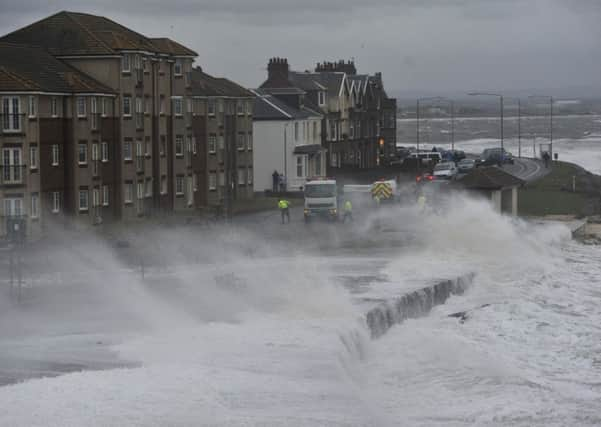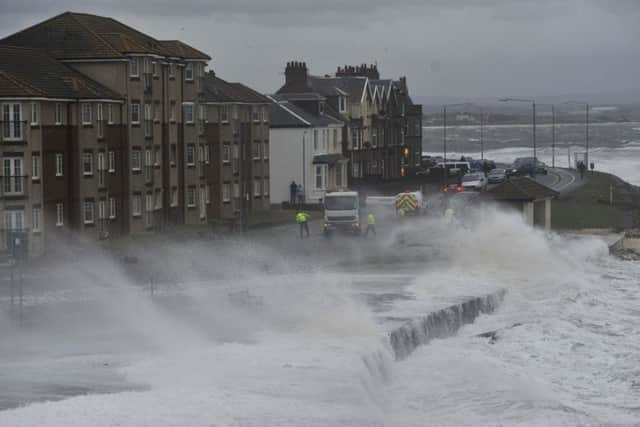Weather: Storms continue to lash Britain


A total of 29 flood alerts and warnings remained in place across Scotland last night as travel disruption blighted the return to work for many south of the Border.
UK environment secretary Owen Paterson said in a statement to the Commons that seven people across Britain had died in the storms since 23 December as flooding and coastal surges hit many areas of the country.
Advertisement
Hide AdAdvertisement
Hide AdThe stormy weather is due to subside in the coming days, with spells of sunshine forecast for Scotland at the end of the week.


The weather front, which originated in the United States, where temperatures have plummeted to as low as -30C, down to –50C with wind chill, was due to pass to the north west of Scotland yesterday evening, leaving behind lower temperatures but more settled conditions.
However, the Met Office issued a “be aware” yellow warning for both wind and rain in four areas of Scotland, which was due to last until the early hours of this morning.
Gusts of up to 70mph were due to whip across the country last night, while the weather agency also warned that up to 40mm of rain could fall on high ground.
In England and Wales, roads have been closed and train services cancelled or delayed in some areas because of the weather.
Waves of up to 27ft were recorded at Land’s End with forecasters warning that coastal areas could see more flooding overnight.
In Aberystwyth, residents of seafront properties along the promenade were again evacuated to a rest centre at a local school, and across the UK dozens of flood warnings, including one severe, remained in place.
Western and southern areas bore the brunt of the latest severe weather, with large waves hitting coastlines throughout Devon, Cornwall and Wales. The highest “severe” level of warning, was issued by the Environment Agency for the Lower Stour in Dorset meaning “there is significant risk to life”.
Advertisement
Hide AdAdvertisement
Hide AdThere are also 105 flood warnings where flooding is “expected” across almost every region in England and Wales, and 219 flood alerts were in force.
North of the Border, the Scottish Environment Protection Agency (Sepa) issued warnings of “expected” flooding in three areas of Argyll and Bute, including Helensburgh, where flooding has already hit the seafront area because of huge waves caused by coastal surges.
A further three warnings were issued in parts of Ayrshire and Arran, including Largs, while ten were in place in Tayside and a further one in Dumbarton.
The lesser warning of “flood alert” was issued for Caithness and Sutherland, Central, Dumfries and Galloway, Orkney, Shetland and Skye and Lochaber.
A Sepa spokesman said the Firth of Clyde and areas around the Solway Firth were at risk of flooding from tidal surges yesterday evening as high winds combined with towering waves and high astronomical tides.
Scotland’s western and northern coastline remains at risk today, while rivers in the Borders are also in danger.
“High tide levels will fall during Tuesday, but a risk of coastal flooding will remain in the northern Isles and the western and northern coastlines into Tuesday with a continued risk of river flooding in the Scottish Borders,” a Sepa spokesman added. “Sepa will continue to monitor the situation.”
The Met Office’s chief forecaster said: “A large, deep depression in the Atlantic is whipping waves up out at sea, these coming into western and southern coastal areas of the UK as a large swell on Monday. Exceptionally high waves are expected, and whilst tides are past their peak of last week, they will still be high, bringing a risk of coastal flooding.”
Advertisement
Hide AdAdvertisement
Hide AdNorthern Ireland has largely escaped any serious flooding or damage but, amid fears of changeable conditions, police announced plans to hand out sandbags in a number of towns close to the Co Down coast, which they believe could be vulnerable to the high tides, wind and rain.
The Environment Agency has estimated that about 220 properties in England and Wales have been flooded so far but more than 205,000 properties have been protected as miles of coastline have been battered.
The transport network has also been hit, with roads closed and trains delayed or cancelled in many areas.
First Great Western warned passengers that there was a risk to services in Cornwall, Devon, Somerset, Wiltshire and Dorset.
The Thames Barrier was in operation last night to protect people and property along the river.
Yesterday, a homeowner was rescued after 13 days stranded in her flooded property.
Anne-Marie Simpson had been cut off since a river near her property at North Curry on the Somerset Levels burst its banks when an initial wave of storms swept Britain on 23 December.
She moved upstairs, stockpiled dry food and decided to “wait it out” until the water level receded, but after the situation worsened, members of the Burnham Area Rescue Boat rescued Mrs Simpson and her dog, Elvis.
Advertisement
Hide AdAdvertisement
Hide AdYesterday, Prime Minister David Cameron pledged that lessons would be learned from the flooding and insisted that the Environment Agency has been given the funding to protect frontline services.
Environment secretary Mr
Paterson, who chaired a meeting of the Cobra emergencies committee yesterday afternoon, said the government’s focus must now concentrate on getting those who have had to leave their homes due to flooding back in to their properties.
Mr Paterson added: “Flood management is a real priority for this government. It has a vital role to play in protecting people and property from the damage caused by flooding and in delivering economic growth.
“Over the current Spending Review period, more is being spent than ever before.”
SEE ALSO: